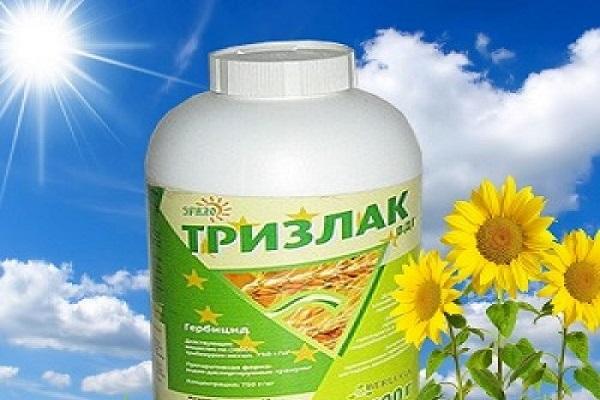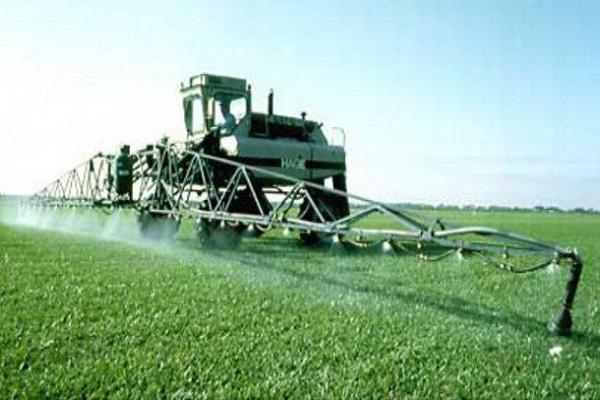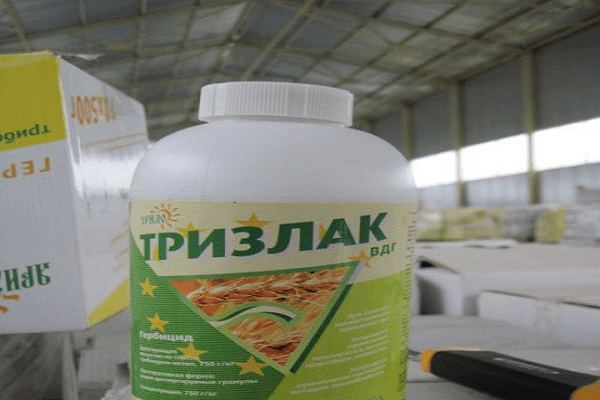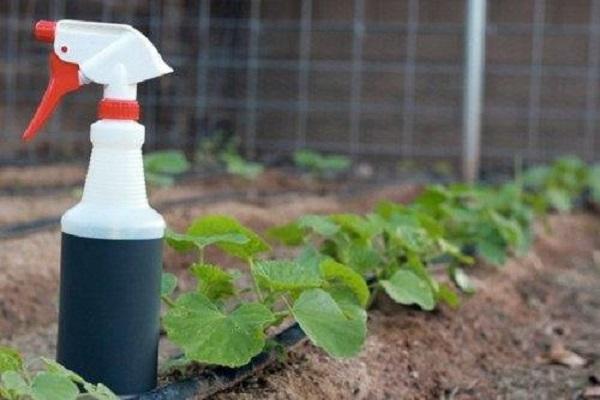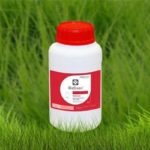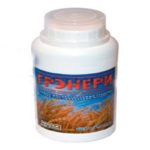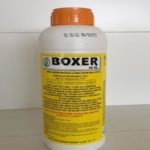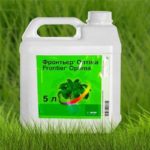Infestation of crops significantly reduces grain yields. Along with agrotechnical methods of controlling weeds, herbicides are widely used for chemical weeding of fields. Trizlak is a systemic herbicide that successfully eliminates dicotyledonous weeds from grain crops. If the instructions are strictly followed and the dosages are observed, the drug does not harm the quality of the crop.
- Composition and release form of the herbicide Trizlak
- Spectrum of action of the drug
- Mechanism of action
- Advantages and disadvantages of herbicide
- Consumption rate
- How to prepare a working solution
- Application of the drug
- Safety precautions
- Compatibility with other drugs
- Shelf life and storage conditions
- Analogues of the product
Composition and release form of the herbicide Trizlak
The basis of the drug is the substance tribenuron-methyl. Its content in Trizlak is 750 grams per kilogram.
The herbicide is water-dispersible granules that quickly and completely dissolve in water when preparing a solution. The drug is packaged in plastic containers with a volume of 0.5 kilograms.
Spectrum of action of the drug
Trizlak's sphere of activity is annual and perennial weed dicotyledonous plants. Weeds with two lobes in the seed have a powerful root and ground part, increased vitality, reduce the protective properties of cultivated plants, resistance to diseases and pests.
The drug is used on oat crops, as well as wheat and barley – winter and spring crops.
Trizlak is effective against the following types of weeds:
- field violet;
- Sophia's descurainia;
- flax bedstraw;
- varieties of poppy, sow thistle, pickleweed, buttercup and chamomile.
Dicotyledons less sensitive to Trizlak include field bindweed, ragweed, and ivy-leaved Veronica.
Mechanism of action
Trizlak is a new generation herbicide belonging to the group of sulfonylurea derivatives. The main difference between these products is their high penetrating ability and bioactivity, which reduces consumption in comparison with drugs of previous generations.
Trizlak is a post-emergence product that acts systemically. Once on the ground part of weeds, it is absorbed and distributed through the conductive system into the tissues of the weeds.
Tribenuron-methyl inhibits the production of an enzyme involved in the synthesis of amino acids and cell division. It acts only on dicotyledonous plants that are sensitive to the active substance, without damaging cereals.
Blocking growth points stops the development of weeds and then leads to their death.
High bioactivity means that after just a few hours the growth of weeds stops; the effect can be noticed after 7-10 days.
Advantages and disadvantages of herbicide
The following important advantages of the drug have been experimentally identified:
- single treatment of crops;
- small dosages of the product used;
- successfully used in complex mixtures;
- Possibility to select spray timing;
- obvious signs of weed damage after 10 days, destruction after 2-3 weeks.
Negative qualities of Trizlak include:
- insignificant impact on certain types of dangerous weeds - bindweed, ragweed;
- reduction of protein and gluten content in grain;
- some dependence of pollination efficiency on weather conditions - lower temperatures, dry seasons.
When using Trizlak, you need to remember the possibility of a negative effect on the soil, and keep in mind that the drug is classified as class 3 hazardous substances.
Consumption rate
The manufacturer offers the following herbicide application rates:
| Culture and growing season | Weed | Trizlak volume | Working solution |
| Spring wheat and barley, oats – at the 2-3 leaf stage | Annual species
Beginning of the growing season |
15-20 grams per hectare of area | 200-300 liters per hectare |
| Spring and winter wheat and barley, oats – the beginning of tillering.
Winter crops are sprayed in spring |
Annual and perennial species
Early growing season |
20-25 grams per hectare | 200-300 liters |
Treatment with Trizlak is performed for weeds that are resistant to herbicides based on 2,4-D and 2M-4X preparations.
How to prepare a working solution
Before opening the container with Trizlak, stir it vigorously in the original packaging.Then the mother solution is diluted - pour one-third of the water into a bucket, add the herbicide while stirring, and add water. The adjuvant is prepared in the same way.
First, diluted Trizlak is poured into the half-filled sprayer tank, then the surfactant and water to the required volume. From a bucket with dissolved herbicide, wash off the remaining product into the tank with water. Mixing is carried out with the hydraulic mixer running.
Application of the drug
Crops are processed using ground equipment; aircraft are not used. The solution, according to the instructions, is sprayed on the day of preparation; the diluted herbicide cannot be stored.
If the weeds have hardened and outgrown the recommended stage, the crops are weakened and sparse, the volume of the applied solution is increased to 400 liters per hectare. In hot and dry weather, the effectiveness is enhanced by the mandatory addition of surfactant DAR-90, Zh. The penetrating ability of the herbicide increases many times over.
Safety precautions
When working with Trizlak, use the usual safety precautions for working with herbicides:
- preparing the solution and filling pollinators in concrete areas;
- workers are protected by special suits;
- the unused mixture is disposed of;
- tanks and spraying devices are washed with water and liquid detergents.
The herbicide is used only on farmland and is not used on private farms.
Compatibility with other drugs
The herbicide can be used in combination with many pesticides and fertilizers. The mixtures do not have a negative effect on the protected plants. The exception is organophosphorus insecticides, which in combination with Trizlak are toxic to the treated crops.
To eliminate weeds that react poorly to Trizlak (in particular, ragwort), prepare a mixture with dicamba or preparations of the 2.4 D group. In this case, the herbicides are combined in half the dosage.
Shelf life and storage conditions
The drug is stored in original, unopened packaging for 3 years in special rooms for storing chemicals. The permissible temperature range is from -20 ° to +30 °.
Important: fields should not be harvested earlier than 45 days after spraying.
Analogues of the product
The following herbicides are produced with the same active substance:
- Agrostar - also used for cleaning sunflower crops and coniferous trees in nurseries;
- Ben Hur, Garnet, Grenadier, Mortar, Himstar are exact analogues;
- Stalker - cultivate sunflower crops in addition to grain crops;
- Express – for hybrid sunflower species.
To treat crops, you can choose any of the drugs containing tribenuron-methyl.
With proper use of Trizlak, it is possible to stop the growth of weeds and clear the crops of dicotyledons, which clog the crops with their powerful stems and roots. It is important to strictly follow the instructions and not miss the timing of the most effective use of the herbicide.

